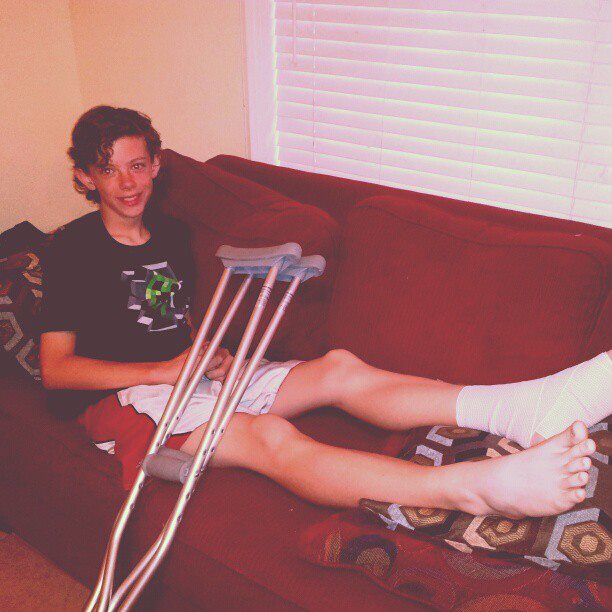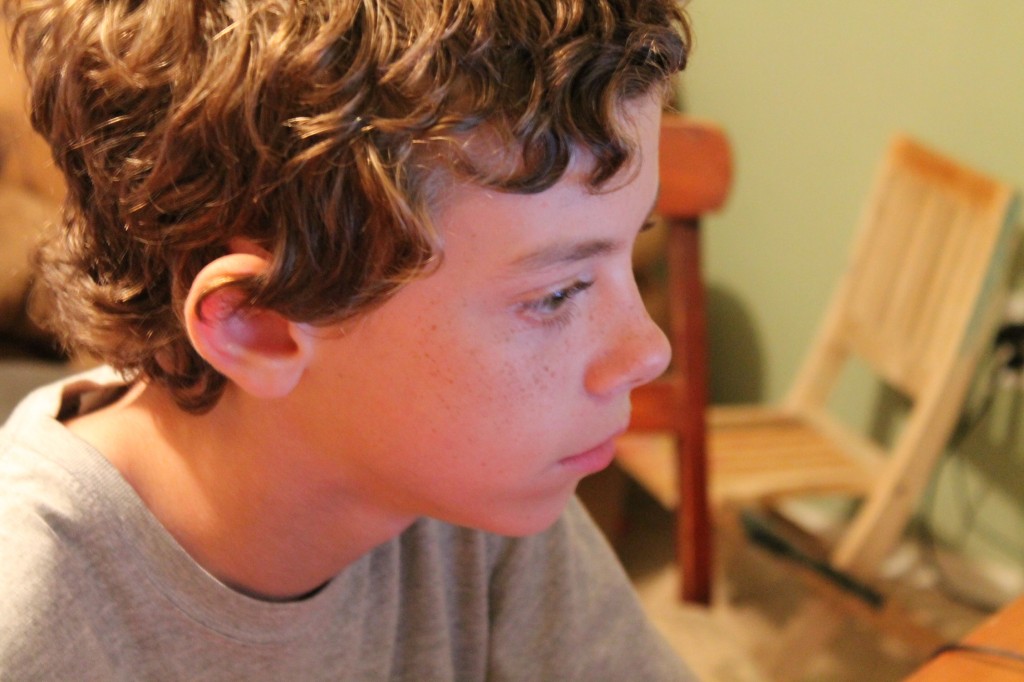Almost two weeks ago, Paxton (11 at the time of this writing) jumped up playing basketball, took a bad landing, and ended up severely spraining his ankle. For the past 13 days he’s been on the couch and I’ve been playing nurse. Injury not withstanding, I’ve really enjoyed this extra time I’ve suddenly gotten with him. We’ve watched countless movies together – everything from Bruce Almighty to Lord of the Rings to a documentary about the Titanic. We’ve watched plenty of TV together too, including a several-episode-long marathon of Criss Angel’s magic. The TV and movies were fun while they lasted, but he eventually asked me to bring him a laptop. We then watched videos on YouTube, shared and compared our various wanderings on our respective computers, and had discussion after discussion about all of the above. He has since moved on to teaching himself card tricks, and he has spent the past 48 hours practicing and perfecting his skills.
In our house, we don’t limit or otherwise try to control television, movies, computers, or other types of “screen time”…. even when no one is injured. All of that technology is simply another tool we’re all free to use, or not use, as we see fit. Sometimes our house is humming with televisions, computers, and video games… and sometimes the only humming comes from the kids. Yesterday (on a rare Sunday at home) no one so much as glanced at a TV until evening came.
When I first became a parent, screen time made me all kinds of uneasy. I wanted my kids (well, my one kid at the time) to read a book, or do a puzzle, or play outside, or use his imagination… not sit in front of a screen. I was self-righteous in my resolve, telling anyone who asked that we didn’t do much TV… that in our house we focused on learning activities. And how much could he possibly learn from a SCREEN?
Well. As it turns out, a lot. As I gradually let go and lifted my limits, I realized that those things I had feared not only didn’t hamper Spencer’s learning, but added to it immensely! We still read books. We still did puzzles. We still played outside. He still used his imagination. But we’d also opened up a whole new world to enjoy together, one that we still appreciate and share… without limits and without conditions. And I wouldn’t have it any other way.
One of the most common questions or objections I get from unschoolers new to the idea of unlimited screen time is that whenever they’ve tried, it’s made their kids unruly or agitated… or as this one reader states, it has just been a “disaster”:
I love the idea of unlimited screen time, but every time I go with it disasters happen. The kids (5 and 3) start bouncing around on the couch, biting each other, kicking, etc. It is worst when they have been watching movies all day so I can’t help but associate it with the screen time.
So why the disaster? Why, if it works so well for us (and for lots of other families) do so many people try it only to pronounce it a failure? Here are a few things that could be happening, in no particular order:
1. They’re bored. They’re watching TV or playing a video game not because they particularly want to, but because no better alternative has been presented or offered. They’re feeling pent-up or frustrated, so it comes out in their behavior. It would come out in my behavior too. Maybe they’d rather be outside, or baking cookies, or drawing a picture, or just hanging out with mom. When that’s the case, it’s not the fault of the screen. It’s simply a matter of being involved, maybe doing a little detective work, offering suggestions, and offering yourself.
2. They’re hungry. Or tired. Or in need of a break. Again, not the fault of the screen. A lot of times, kids (and adults for that matter) will get really engrossed in something and not listen to their bodies. They miss cues of hunger or fatigue until they’re to the point of grumpy. Ideally, as parents we should step in before that happens.
3. Parents are coming into it with preconceived ideas about how it will affect their kids. In other words, they’re expecting their children to behave in a negative way. In the same way that many parents who think, “Oh if he has those cookies now, he’ll be bouncing off the walls all night” will then observe said bouncing off the walls, and feel validated for being right… even if the behavior was completely unrelated. Even if the perceived “hyper” behavior wasn’t so unreasonable after all. We tend to see what we want to see.
4. The child/children have just gotten really engrossed in what they’re watching or playing, to the point of wanting to shut out what’s going on around them, and being frustrated by distractions and interruptions. I know a lot of people think of things like TV watching as passive activities. You just sit and stare and become a zombie. I have never found that to be case. For me (and for my kids who choose to watch TV) I think it’s often the opposite. I get very involved. Certain shows and movies make me come alive. I fall in love with the stories,with the dialogue, with the writing, with the timing. And just as with any other activity that I’m really immersed in…. whether it’s watching a movie, or reading, or writing, or creating something… when I’m interrupted or have to stop, I feel frustrated. And while as an adult I can generally sometimes handle that frustration and transition without making too much of a fuss about it, it’s twenty times harder for a child.
5. Maybe it really does affect your child differently than mine. (There’s my little disclaimer: I don’t pretend to know the inner workings of someone else’s child or family) If that’s the case, I strongly believe that there’s still a way to come to a peaceful and respectful solution that takes everyone’s needs and wishes into account, without being controlling and falling the way of using screen time as a punishment or reward.
Our lives are richer because of technology to be sure :: said as she types on her laptop with high speed internet while simultaneously watching a sci-fi movie with the 11 and 7 year olds :: At the same time, because it’s treated as no more or less important or valuable as any of the other tools at our disposal, the kids can all take it or leave it.
Right now, they’re leaving it. The movie got too confusing, and there are important card tricks to be done.
________________________________________________________________________
You might also want to read No thank you, we’ll stay plugged; and Blame the Video Games











